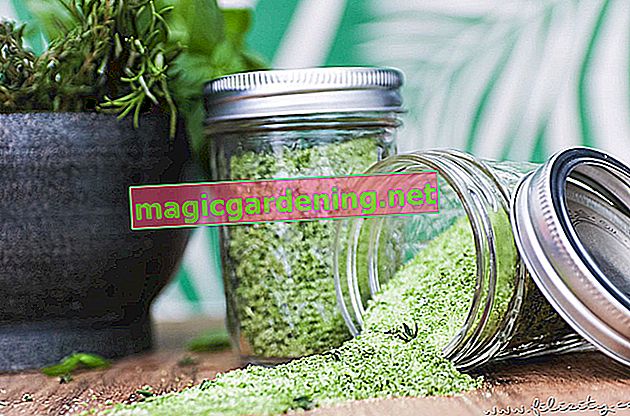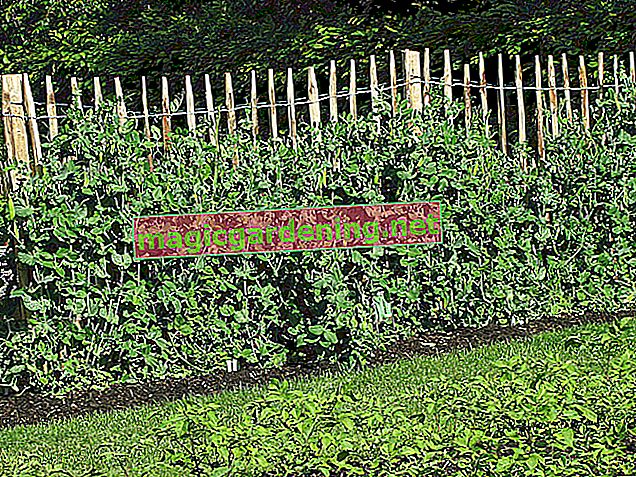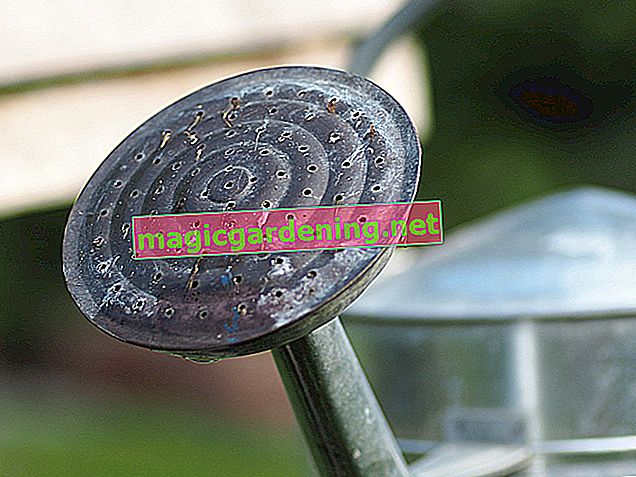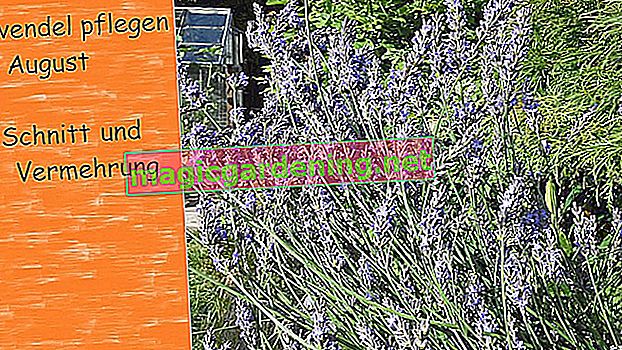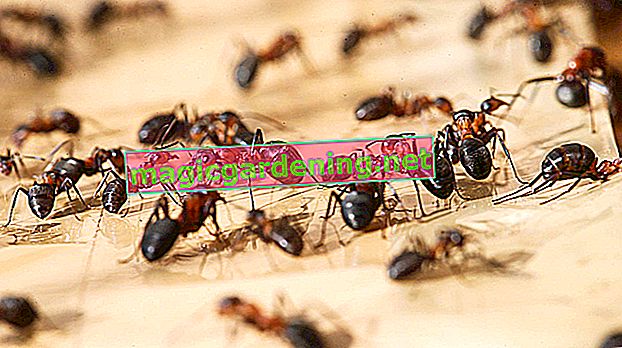
Tip 1: Relocate the ant nests - the gentle tour
The animal-friendly gardener does not condemn busy ants to death just because they have settled in the lawn. Instead, ant control aims to motivate the insects to move to another shelter. However, this undertaking is only crowned with success if the queen joins her people. This is how the plan works:
- Fill a large clay bucket with wood wool
- Place it overturned so that it covers the emerging hill
- Alternatively, place it upside down in close proximity to an ant nest
also read
- Fighting weeds in the lawn - the 10 best tips
- Cleverly removing old lawn - the best 4 options
- Fighting weeds in the lawn - tips for correct scarifying
Give the ants a few days to move. Long rows of workers carrying the offspring into the pot are a sure sign of success. As soon as the caravan is over, pick up a spade, slide it under the pot and carry the people to a safe place.
Tip 2: Worry about smells - this is how it works
Ants are endowed with a sensitive sense of smell, which is primarily used for orientation. With intense smells, this perception is paralyzed to such an extent that the hymenoptera full of gnomes seek the distance. In this way, the plague of ants in the lawn quickly comes to an end without having to take out the chemical club. These fragrances promise maximum success:
- Garlic broth
- Mix of camphor and alcohol
- Cheap perfume
- Japanese healing plant oil
If ant nests are repeatedly sprayed with these liquids, the workers pack the suitcases and the whole colony moves out. Essential herbs that have proven themselves in natural ant control have a similar effect. If you put eucalyptus, anise, sage, lemon balm, lavender and similar herbs around the ant nests, the ants' plague will be history within a short time.
Tip 3: activate natural opponents
If the plague of ants gets out of hand in the lawn, knowledgeable gardeners get help from the predators of the pests. The following animals in the garden like ants to eat:
- Birds of all kinds, especially the green woodpecker
- Beetles, like the black weevil
- Dragonflies
- be crazy
- Toads
One of the most dangerous enemies for ants is the ant lion, the insect of the year 2010. The clever ant lion catches the crawling animals with a self-made funnel trap on fine-grained sand. All these beneficial insects like to settle in the natural garden. You should therefore create places of retreat such as a dry stone wall, dense hedges, rotten tree trunks or piles of leaves
Tip 4: End the ants plague with nematodes without toxins
Natural antagonists of a special kind have included ants in their prey scheme for millions of years. We are talking about nematodes, tiny nematodes that were discovered in fossil workers. In modern ant control, the nematodes of the genus Mermis are applied as a non-toxic preparation to the ant nests, where they remove the plague of ants from the world.
Tip 5: Disrupt your orientation with vinegar and tea tree oil
Functioning ant nests depend on the workers finding their way back there again and again, richly laden with food for the brood. For this purpose, the insects mark the walkways with their own fragrances. The people are doomed when these scents are masked. Vinegar is ideal for this purpose, as is the slightly milder tea tree oil.
Spray the paths towards the lawn and ant nests every few days with vinegar water or diluted tea tree oil, this measure ends the ants plague in no time. It is important to note that you do not spray the liquid directly onto the grass.
Tips
The yellow meadow ant is one of the most common ant species in Europe. Their ant nests are mainly located in lawns or meadows and are usually completely overgrown. A single colony houses from a few hundred to several thousand workers. 100,000 workers cavorted in the largest building discovered so far.
Tip 6: Use baking soda to combat ants plague
The raising agent baking soda has earned a good reputation in the field of ant control. However, baking soda alone has no effect against the ants plague. Only in combination with sugar do you draw a line under the ants plague in this way. Repeatedly scattered on the ant nests, the pests eat the mixture and perish on the released ammonia.
Tip 7: catching ants with beer - this is how it works
Best known as an effective remedy against voracious snails, the beer trap also meets expectations against an ant plague in the lawn. How to do it right:
- Fill a flat plate with boarded beer
- Mix in a tablespoon of honey
- Set up in the immediate vicinity of the ant nests
Since they are crazy about sweets, the ants crawl into the plate and drown in the alcoholic liquid.
Tip 8: Consistently disturbing ant nests in the context of lawn care
In view of the hustle and bustle around ant nests, it is astonishing, but the nuisances actually want to have their peace. Regular lawn care is therefore an effective way of making the crawling animals as uncomfortable as possible. How to fight ants through disturbance of the peace:
- Mow every 7-10 days from April to September
- Before mowing the lawn, level the hills of the ant nests
- Always include the construction in the summer lawn
The annual maintenance liming of the lawn not only prevents over-acidification of the soil; at the same time, ants will be careful not to build a new burrow in a limed lawn.
Tip 9: Ant control with plant manure - instructions
In domestic ant control, frowned upon, you can sustainably tackle an ants plague in the lawn with the smell of plant manure. You can easily make nettle manure yourself and use it to spray ants' nests until the beasts move away. Using the following recipe, you can not only make nettle liquid yourself, but also other mixtures, such as vermouth or leghorn brew:
- Soak 1 kilogram of fresh nettle leaves in 10 liters of water
- Set up in the sunny garden area and cover with wire mesh (€ 14.99 at Amazon *)
- Let it steep in a wooden tub for 14 days and stir daily
After completion of the fermentation process, the liquid manure is strained and is immediately ready for use. Diluted in a ratio of 1:10, spray the ant nests in the lawn repeatedly. Include the entire lawn and fertilize the green naturally at the same time.
Tip 10: combating aphids drives away ants - this is how it works
Ants are not far away where aphids frolic on plants. It is the honeydew excreted by the pests that attracts the ants. Ant control in the garden therefore goes hand in hand with lice containment. If you are confronted with a plague of ants in the lawn, deprive the insects of their food source by the following procedure against aphids:
- Spray with a mix of 1 liter of water and 15 ml of curd soap and alcohol
- Repeatedly pollinate plants with pure charcoal ash or rock flour
- Make a broth from 3 cloves of garlic and 1 liter of water and treat the plants
In addition, the specialist trade has pesticides on the basis of neem or rapeseed oil, which have proven to be effective against aphids and thus also make the garden unattractive for ants.
Tips
The longest life span of a queen ant was 28 3/4 years. The specimen was caught in August 1931 and only blessed the temporal in April 1960. It was a mated queen of the black garden ant, who laid fertilized eggs until she died.
GTH




